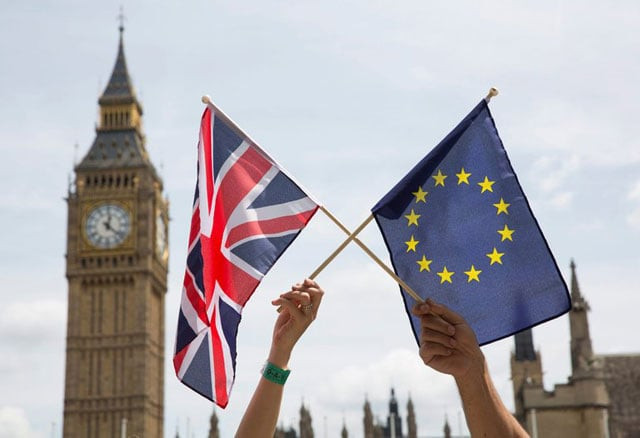Hard Brexit to have significant implications for Pakistan’s exports
Policymakers should seek trade policies that remove any negative impact.

PHOTO: AFP
Although the United Kingdom has two years to negotiate a deal with the European Union (EU), the outcome of trade negotiations between the UK and the EU can have implications for exports of Pakistan.
EU countries are members of a single market which means goods, capital, labour and services can move freely from one member to another. The scope of post-Brexit arrangements will involve either extreme ‘hard’ measures such as complete withdrawal from the EU or soft measures which retain certain aspects of the existing customs union.
Post-Brexit relations discussed
If hard measures are adopted, the UK will undertake independent trade agreements with EU member countries as well as with non-member countries.
Regardless of the measures, it is crucial to determine the pattern of imports into the UK from Pakistan as it was the third largest export destination for Pakistan in 2016.
Trade pattern
The UK has strong colonial linkages with Pakistan and it played an important role in the award of GSP Plus status to Pakistan by the EU in 2014.
Five out of top 10 export destinations for Pakistani products in 2016 were EU member countries. In the year, Pakistan’s exports totalled $21.7 billion, of which $1.59 billion –7.3% – came from the UK.
In comparison, Pakistan exported more than $1.2 billion worth of goods to Germany and $800 million was earned from Spain.
With more than 20% of total exports from Pakistan to the EU destined for the UK, a harder Brexit process that involves renegotiation of trade agreements will have significant consequences for Pakistani exporters.
On the other hand, the UK made imports of $636 billion from all of its trading partners. Therefore, even if the UK government does offer concessions to all developing economies, similar to the GSP and GSP Plus status offered by the EU, the onus of ensuring that incentives lead to expansion in the trading relationship between Pakistan and the UK will primarily rest on Pakistani policymakers.
Total exports from Pakistan between 2015 and 2016 fell by 4.3% while exports to the UK declined by 2%.
Imports from Pakistan into the UK are heavily concentrated in textile products, which contribute 82% of total imports. Vegetable products account for 4% and leather products account for 3%.
On the other hand, textile products constitute 5%, vegetable products constitute 2.6% and leather products constitute 0.6% of total imports into the UK from all its trading partners.
Nine out of the top 10 products imported into the UK from Pakistan, which account for more than 50% of all imports into the UK from Pakistan, were made-up textile articles.
The UK also imported more than $27 million worth of husked rice, which constituted approximately 82% of all cereals imported into the UK from Pakistan.
As with total exports from Pakistan, the exports to the UK are heavily concentrated in a few selected products.
On the other hand, more than 94% of total imports into the UK from Pakistan in 2016 were industrial goods.
Even though Pakistan typically exports low value-added products, a significant proportion of imports into the UK from Pakistan is likely to involve value addition in Pakistan. The UK and the EU are a major market for the value-added consumer goods exported from Pakistan.
A restructuring of trade between Pakistan and the UK can have an adverse impact on value-added exports, particularly in the textile industry.
Pakistan welcomes Britain’s desire to join CPEC
Other larger EU member countries such as Germany, France and Spain also import a similar range of products from Pakistan. Therefore, exporter networks are likely to exist between Pakistan and the EU member countries that rely on symmetrical market access offered by various EU members.
With the most important export destination of Pakistan opting to leave the EU, it is imperative that Pakistani policymakers seek trade policies that alleviate any negative impact, particularly if hard measures are to be adopted by the UK.
The writer is Assistant Professor of Economics & Research Fellow at CBER, IBA
Published in The Express Tribune, April 10th, 2017.
Like Business on Facebook, follow @TribuneBiz on Twitter to stay informed and join in the conversation.


















COMMENTS
Comments are moderated and generally will be posted if they are on-topic and not abusive.
For more information, please see our Comments FAQ